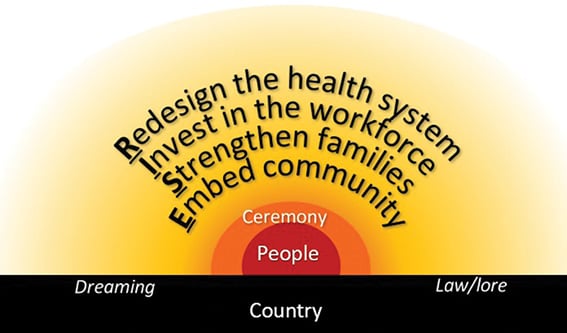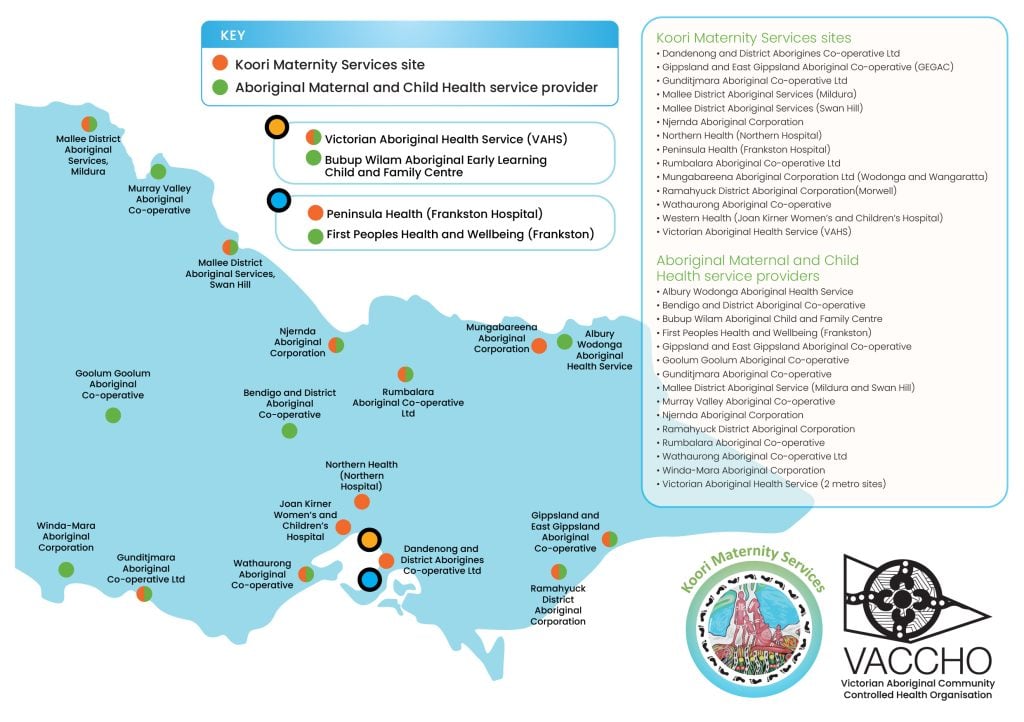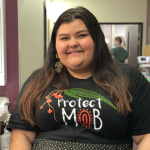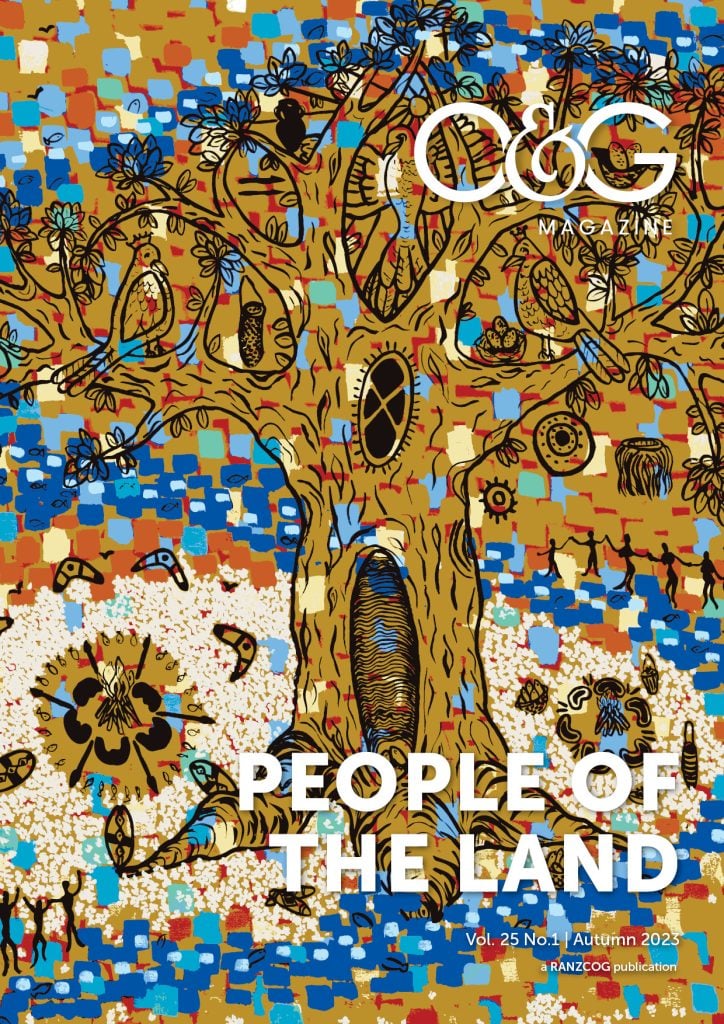The Koori Maternity Services (KMS) program is a unique model of care, and has proven to be an integral component of the Victorian maternity sector for over 20 years. Approximately 30% of all Aboriginal and Torres Strait Islander families birthing in Victoria will receive some care through the Koori Maternity Services program [unpublished data]. The term Koori refers to Aboriginal people from South Eastern Australia, mainly Victoria and parts of New South Wales, but not all people who access the KMS program are Koori.1 The KMS program provides access to holistic, culturally safe maternity care for Aboriginal and Torres Strait Islander women, boorai (babies) and their families during pregnancy. Koori Maternity Services also supports non-Aboriginal women having Aboriginal and Torres Strait Islander babies, as well as all carers of Aboriginal and Torres Strait Islander babies – such as grandparents and kinship carers.
Victorian Aboriginal maternity context
Aboriginal and Torres Strait Islander women in Victoria and their babies continue to experience higher rates of severe acute maternal morbidity (3.6% v 1.5%), smoking in pregnancy (41.3% v 7.5%), preterm birth (13.4% v 7.8%), low birth weight (10.9% v 6.5%), stillbirth (7.8 v 6.3 per 1,000 births), neonatal mortality (3.5 v 2.5 per 1,000 births) and perinatal mortality (11.3 v 8.7 per 1,000 births) when compared to non-Aboriginal women.2
Culturally specific models of care (sometimes called ‘Birthing on Country’ services) which align to the RISE framework, have been well established as effective in many domains, including in the reduction of preterm births.3

The RISE framework of First Nations
maternity care
Koori Maternity Services background
It is important to acknowledge that Aboriginal Community Controlled Organisations (ACCOs) across Victoria have been delivering care and providing support to growing Aboriginal families for decades, regardless of whether they have ever been formally funded to provide maternity services.
The Koori Maternity Services program was first established in the year 2000 at eight ACCO sites as an advocacy-linkage-health promotion model. KMS was designed by Aboriginal women for Aboriginal families in response to inequity of access to culturally safe care in the mainstream maternity sector. In 2009, the program expanded to incorporate midwives in a clinical model of care, recognising the need to respond to the disparity in health outcomes experienced by Aboriginal mothers and boorai.
Today, eleven Koori Maternity Services programs are located in ACCOs and three have been established in public hospitals.
Koori Maternity Services program
The objective of the Koori Maternity Services program is to improve equity of access to culturally responsive and high-quality primary maternity care, to each Aboriginal family, in the context of their local Aboriginal community. Each KMS team:
- Provides comprehensive, flexible and holistic pre-conception health care, sexual and reproductive health care, family planning advice, pregnancy choices information and care, antenatal care, childbirth education, postnatal care, bereavement support, breastfeeding assistance and early parenting support;
- Facilitates relationships between women and birthing hospitals;
- Embeds culture and health promotion activities into holistic pregnancy care;
- Delivers continuity of care across the antenatal and postnatal periods to birthing families;
- Provides additional support and care co-ordination for families who may be experiencing vulnerabilities;
- Collaborates with other healthcare professionals, specialists and services to ensure each family’s needs are met; and
- Utilise trust and relationships to improve outcomes for Aboriginal and Torres Strait Islander women and babies.
The KMS program also strives to improve health and wellbeing outcomes and specifically aims to:
- Optimise the health and wellbeing of women and their babies;
- Identify and manage maternal and fetal risk factors, particularly early in pregnancy; and
- Reduce perinatal morbidity and mortality, including incidence of preterm birth and low birth weight babies.4
This state-wide program is delivered by Registered or Endorsed Midwives, Aboriginal Health Workers and Practitioners and Aboriginal Hospital Liaison Officers who work in a complementary team of two or more health professionals. Koori Maternity Services staff are a specialised and highly trained workforce, with some KMS staff also being qualified as Maternal Child Health Nurses, Nurse Immunisers, Childbirth Educators and Internationally Board Certified Lactations Consultants (IBCLCs). Each KMS program tailors their model of care to their local community, and have access to culturally appropriate resources about pregnancy, breastfeeding and parenting – affectionately called the Boorai Bundle.

A map of Koori Maternity Services across Victoria
The ultimate goal for the Koori Maternity Services program is that all Aboriginal and Torres Strait Islander families in Victoria receive culturally safe maternity care. This encompasses the health and wellbeing of boorai, parents, and entire kinship network from pre-conception through to the conclusion of the postpartum period, acknowledging that healthy pregnancies and positive early parenting experiences have the power to transform the health and wellbeing of the entire Aboriginal community. This aligns with the overall vision of the Victorian Aboriginal Community Controlled Health Organisation (VACCHO): “Vibrant, healthy, self-determining Aboriginal communities”.5 VACCHO is the peak representative body for Aboriginal health and wellbeing in Victoria. The Koori Maternity Strategy team within VACCHO support the KMS programs across the state and advocate for systemic maternity care reform.
Acknowledging the importance of the Koori Maternity Services program, the Victorian Government has committed to expanding the KMS model across Victoria and increasing the availability and quality of cultural safety in mainstream maternity services through the uptake of KMS guidelines.6
A social model of health
Koori Maternity Services programs and the ACCO sector meet the needs of the Aboriginal and Torres Strait Islander community in Victoria by operating as social models of health, recognising how cultural, spiritual, social, political and environmental factors contribute to physical and emotional health and wellbeing. Even when a client may require obstetric input, KMS programs and ACCOs are well placed to provide additional or intensive support to families, including:
- dental care;
- nutrition and exercise initiatives, including community lunches;
- social and emotional wellbeing, including mental health support;
- housing support;
- smoking cessation programs;
- alcohol and other drugs recovery and support;
- sexual and reproductive health services;
- respectful relationships programs and specialist family violence support;
- maternal and child health;
- visiting specialist services, such as paediatricians;
- dedicated groups for men, women, Elders, children, youth, “mums and bubs”;
- community events for culturally significant dates and health promotion opportunities; and
- transportation to medical appointments.
Flexible service delivery
Koori Maternity Services programs are not bound by the same time structures, busy clinic lists and rigid hospital policies as mainstream services. Structured booking and triage processes keep hospitals ticking, but prevent most women from receiving pregnancy care in the hospital during the first trimester. In hospital, social and cultural support is often limited by visitor policies. At the same time, rigid funding models and service demands in the mainstream sector prevent most women in Victoria from receiving postnatal care in the home beyond one-week post birth.
The KMS teams have access to a dedicated vehicle allowing for the flexibility to offer assertive outreach in a client’s home and extended postnatal care up to six weeks postnatally. On average, women who receive care through KMS receive 16.5 hours of care outside of hospital admission/s and mainstream care, which is 3-4 times higher than women receiving care through the public hospital system alone [unpublished data].
Most importantly, KMS provides continuity of care to women who may not otherwise receive it. The benefits of midwifery continuity of care have been well established for all women regardless of risk profile, but Aboriginal and Torres Strait Islander women are often “risked” or “costed” out of midwifery continuity models of maternity care. Outside of Melbourne, there are very few hospitals that offer culturally specific models of maternity care. A recent Victorian study demonstrated that over 90% of Aboriginal and Torres Strait Islander women wanted access to midwifery continuity of care when it was made available to them.7
Partnerships and collaborations are key to Koori Maternity Services success
Koori Maternity Services is not in competition with other care providers or services. The success of KMS comes down to valuable partnerships and collaborations being at the centre of a family’s care. The KMS team collaborate with the family, with each other, within the ACCO, and with the birthing hospitals, specialists and other external services. KMS also collaborates with hospital-based cultural models of care.
Families meet with their Maternal Child Health Nurse during pregnancy in alignment with the Aboriginal Maternal Child Health principles to ensure continuity of care across the early years. KMS teams collaborate with some incredible obstetricians and GP obstetricians to provide care to women that primary health and community health services are unable to provide.
Advocating for formal partnerships, streamlined two-way collaborative pathways and referral processes, as well as sharing of information systems and professional development opportunities can build and advance your relationship with local ACCOs and the Aboriginal and Torres Strait Islander community.
It is our shared responsibility to ensure that Aboriginal and Torres Strait Islander families receive equitable access to quality and culturally responsive maternity care.
Our feature articles represent the views of our authors and do not necessarily represent the views of the Royal Australian and New Zealand College of Obstetricians and Gynaecologists (RANZCOG), who publish O&G Magazine. While we make every effort to ensure that the information we share is accurate, we welcome any comments, suggestions or correction of errors in our comments section below, or by emailing the editor at [email protected]. Those pictured have provided consent for their name and image to be included.
References
- Campbell S. From Her to Maternity: A report to the VACCHO members and the Victorian Department of Human Services about Maternity services for the Aboriginal woman of Victoria. Collingwood (AU): VACCHO; 2000.
- State of Victoria, Safer Care Victoria. Victoria’s Mothers, Babies and Children 2020. Melbourne (AU): State of Victoria; 2021. Available from: https://www.safercare.vic.gov.au/sites/default/files/2022-05/FINAL%20CCOPMM%20REPORT_SCV-2020.pdf
- Kildea S, Gao Y, Hickey S, et al. Effect of a birthing on country service redesign on maternal and neonatal health outcomes for first nations Australians: A prospective, non-randomised, interventional trial. Lancet Glob Health. 2021;9(5):651–9. Available from: https://www.thelancet.com/journals/langlo/article/PIIS2214-109X(21)00061-9/fulltext. doi:10.1016/S2214-109X(21)00061-9
- State of Victoria, Department of Health and Human Services. Koori Maternity Services Guidelines Melbourne (AU): State of Victoria; 2017. Available from: https://www.health.vic.gov.au/sites/default/files/2022-05/koori-maternity-services-guidelines.pdf
- VACCHO. 5 year strategy. Collingwood (AU): VACCHO; 2023 (updated 2023 cited 2023 January 30). Available from: https://www.vaccho.org.au/about/5-year-strategy/
- State of Victoria, Department of Health and Human Services. Korin Korin Balit-Djak: Aboriginal health, wellbeing and safety strategic plan 2017–2027. Melbourne (AU): State of Victoria; 2017. Available from: https://www.dffh.vic.gov.au/publications/korin-korin-balit-djak
- McLachlan HL, Newton M, McLardie-Hore FE, et al. Translating evidence into practice: Implementing culturally safe continuity of midwifery care for First Nations women in three maternity services in Victoria, Australia. eClinMed. 2022;47(101415):1-13. Available from: https://www.thelancet.com/journals/langlo/article/PIIS2214-109X(21)00061-9/fulltext doi:10.1016/S2214-109X(21)00061-9





Leave a Reply